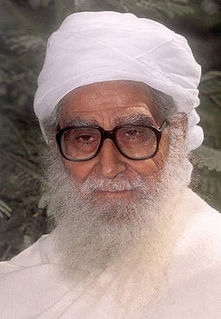Top 7 Quotes & Sayings by Maulana Wahiduddin Khan
Explore popular quotes and sayings by an English activist Maulana Wahiduddin Khan.
Last updated on April 15, 2025.
Not all Muslims become involved in acts of violence. Yet all might be held culpable. THis is because that section of Muslim--in fact, the majority--who are not personally involved, neither disown those members of their community who are engaged in violence, nor even condemn them. In such a case, according to the Islamic Shariah itself, if the involved Muslims are directly responsible, the uninvolved Muslims are also indirectly responsible. (p. 91)
There are certain verses in the Quran which convey injunctions similar to the following: 'Kill them wherever you find them.' (2:191) Referring to such verses, there are some who attempt to give the impression that Islam is a religion of war and violence. This is total untrue. Such verses relate in a restricted sense, to those who have unilaterally attacked the Muslims. The above verse does not convey the general command of Islam. (pp. 42-43)






















